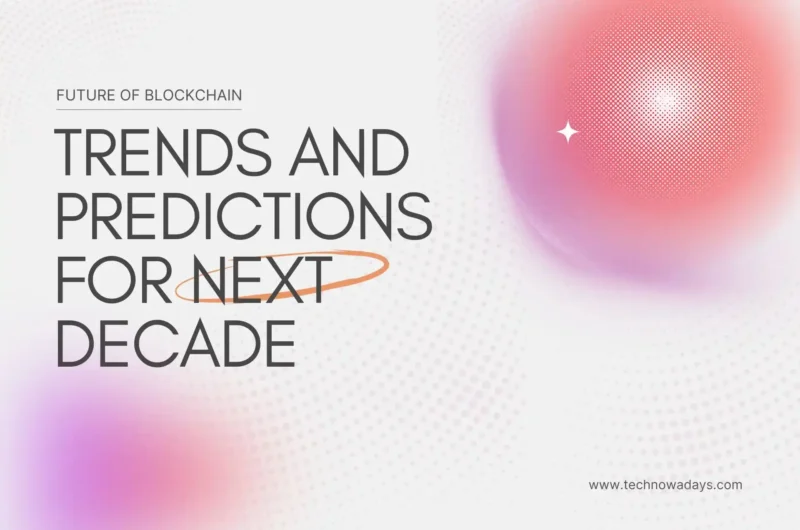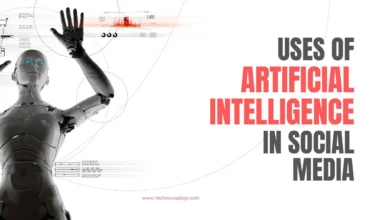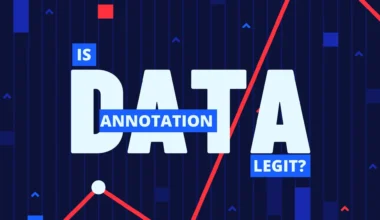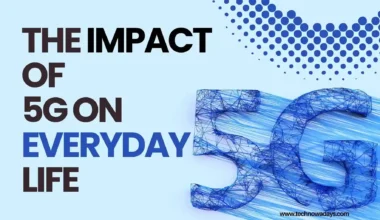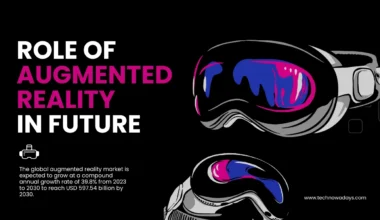Blockchain is one of the biggest and most tremendous technologies in the 21st century. Due to its ability to manage cryptocurrency systems, it has become the interest of several top-notch businesses and companies in the world.
Therefore, to provide a better understanding about the future of blockchain, its trends and predictions, we will discuss its impact in several industries. Stay tuned with us.
What is Blockchain Technology?
Blockchain is an immutable, shared, or distributed database in a computer network that supports and tracks the process of transactions and keeps the record in the business network. Blockchains are famous for their unprecedented applications in the crypto industries; where they maintain a secure and decentralized record of each transaction in the cryptocurrency system.
However, their use is not limited to cryptocurrency; their applications are widely spread to different industries to make data that is immutable or unable to be altered. There is no way to change data in the blockchain, your data will stay the same, however, the only problem you may face is uploading the wrong which can be the work of auditors or any other official.
These incredible features to keep the information secure make the future of blockchain even more bright.
No wonder blockchain is a new technology in the market; people are still highly attracted to it. According to Zippia, 300 million people are using blockchain technology around the world. Moreover, around 82 million users around the world are using blockchain wallets.
These numbers are increasing daily as people show more interest in the Bitcoin and cryptocurrency market. Further we will discuss the future of blockchain, its trends and prediction, however, to understand them it is essential to learn about its working process and impact on various industries.
How Does Blockchain Work?
In the business world, information is everything. The success of any business depends on the accuracy and authenticity of its data. Blockchain provides fast, immediate, observable, and highly accurate information that is stored and fully secured on an immutable ledger.
They can also control access to this information by permitting only trusted and relevant officials on the blockchain. The authorized member can see the complete details of a transaction from end to end, this makes your deals and transactions more authentic, confident, and trusted in the industry.
There are some key elements that play an important role in the working of blockchain that we will discuss further, keep reading!
Key Elements of Blockchain
Basically, a blockchain is like any other database, such as a spreadsheet with a key difference in how it stores, structures, and accesses data and information which is quite different from traditional databases.
Moreover, blockchain consists of programs named scripts that add, store, and access it. As you know, it is a distributed database, so when you store any information it is stored in multiple places, therefore, the data must be the same in all places to ensure its validity.
Following are some key components of blockchain:
-
Distributed Ledger Technology
Unlike traditional business networks, where you can see the risk of data duplication, blockchain consists of a distributed ledger, where you can only record the transaction information once, which will become unchangeable as no one can alter or duplicate it.
-
Immutable Records of Transaction
Immutable means anything that cannot be altered or changed at any point. As mentioned earlier, the right information is very important for any business. Therefore, the blockchain does not allow members to change the stored transaction record.
However, if you mistakenly stored the wrong data, you have to add a new transaction to store the right information, but both records will be viewed by every member. This is how the blockchain maintains the transparency of data on its platform.
-
Smart Contracts
Smart contracts, a set of rules, are available on the blockchain to increase the speed of transactions. They are usually used for corporate bond transfers and include different transaction terms and conditions.
Working Process of Blockchain
The process is similar to the traditional database process, where it collects the information and records it in a cell, such as a database-like spreadsheet, also called a block. The block can record different types of information such as who, what, when, and where.
-
Case Study to Understand the Process
Let’s discuss a case to understand the process of blockchain, for example, if you made a Bitcoin transaction by using your cryptocurrency wallet, the transaction record would go to a pool of memory where it would stay in a queue until a block fills up the transaction record.
The block then gets closed and encrypted using an encryption algorithm so no one can alter this information. This process can be explained in three further sections:
-
-
Occurrence of Transaction and Block of Data
-
Transactions show the movement of data and different tangibles and intangible assets in the system. Similarly, the block records all types of information that you want to store, even the color of different items such as cars, and the temperature of food that you want to ship.
-
-
Network of Blocks
-
The block of information creates a chain of data, where you can see the movement of assets and their ownership. It also tells the exact time of the transaction and the sequence of information.
-
-
Data Blocked in an Irreversible Chain
-
Each block in the blockchain is protected with an irreversible method, where no one can temper and change the information.
Application of Blockchain in Various Industries
- Applications Blockchain in Finance
- Blockchain in Supply Chain Management
- Application of Blockchain in the Health Sector
Blockchain Trend and Predictions for the Next Decade
The future of blockchain has outstanding applications for business professionals and different departments. Its disruptive applications have a huge potential to make our lives easier in the coming decades.
The following are some industries where blockchain is an emerging technology.
Blockchain Supply Chain Management
Even though the blockchain market is new, its size in the supply chain market is around $0.84 billion, which is growing at a rapid speed. The logistics and supply chain management sector is a complex ecosystem in which you must deal with multiple consumers and dealers daily.
A single product goes through several phases, starting from production to the final consumer, where it goes from processor, distributor, and retailer to the end customer. Keeping a record of each phase using a traditional database is challenging, as there is a chance of data duplication and tempering.
It is also not good to maintain the authenticity and transparency of the information. Therefore, a blockchain banking system is the best alternative to have a transparent record of transactions.
However, the future of blockchain has the potential to bring transparency and high security to each transaction. Similarly, it also keeps different members of the network accountable and trusted while they make transactions.
So, the future of blockchain in supply chain management will provide a large amount of services to the business community. Similarly,
Future of Blockchain in Cybersecurity
Till now you must have understood how secure and credible the blockchain networks are, as there is no chance of data altering. So, it is no wonder that cybersecurity is the promising quality of blockchain as it can prevent data from tempering.
The decentralization of blockchain has made it authentic, organized, and ideal for business transactions and end-to-end asset monitoring. Therefore, this platform is a secured blockchain finance hub.
Blockchain in the Healthcare Sector
People in the healthcare sector can also use blockchain networks to maintain and secure information. They can also limit the access of authorized people to prevent data tampering and duplication.
Moreover, with a blockchain healthcare database, there is no need for any central server to keep the record secure and enable rapid access to all of the information.
Challenges of Blockchain Technology
Blockchain trends and their outstanding applications in different departments show that the future of blockchain is going to bring several services in every area. However, there are several challenges that experts have to overcome to counter the widespread use of blockchain by common people.
- The most significant issue about blockchain networks is there are still no authentic rules on how the government deals with blockchain transactions.
- The user requires a huge amount of resources and energy to manage the blockchain which creates scalability issues.
- Blockchain technology is still new for people and quite complicated to understand and work with.
- Several blockchain systems like bitcoins need a lot of energy and work from an expert to properly manage the system.
Conclusion
Blockchain technology has extensive features and has a far more significant impact on various industries in the business world. However, you have to understand the complications of this system to get the benefits of its incredible features.
You have to learn about its regulations and transaction methods to keep yourself aware of any fraud or scam on the network. No wonder, the future of your business is in the future of blockchain.

